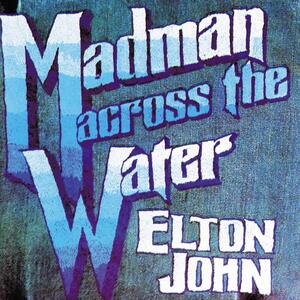
Madman Across the Water is the fourth studio album by English musician Elton John, released on 5 November 1971 by DJM and Uni Records. The album was his third album to be released in 1971, at which point John had been rising to prominence as a popular music artist. John's first progressive rock album, Madman Across the Water contains nine tracks, each composed and performed by John and with lyrics written by songwriting partner Bernie Taupin. Yes keyboardist Rick Wakeman plays Hammond organ on two songs.

Honky Château is the fifth studio album by English musician Elton John. It was released on 19 May 1972, and was titled after the 18th century French chateau where it was recorded, Château d'Hérouville. The album reached number one on the US Billboard 200, the first of John's seven consecutive US number one albums.
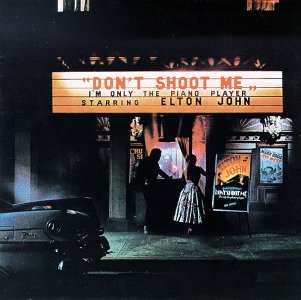
Don't Shoot Me I'm Only the Piano Player is the sixth studio album by English musician Elton John. Released on 26 January 1973 by DJM Records, it was the first of two studio albums he released in 1973, and was his second straight No. 1 album on the US Billboard 200 and first No. 1 album on the UK Albums Chart.

Rock of the Westies is the tenth studio album by English musician Elton John, released on 24 October 1975. The title is a pun on the phrase "West of the Rockies", the album having been recorded at Caribou Ranch in the Rocky Mountains of Colorado.
"Candle in the Wind" is a threnody style ballad written by English musician Elton John and songwriter Bernie Taupin, and performed by John. It was originally written in 1973, in honour of Marilyn Monroe, who had died 11 years earlier.

"Pinball Wizard" is a song by the English rock band the Who, written by guitarist and primary songwriter Pete Townshend and featured on their 1969 rock opera album Tommy. The original recording was released as a single in 1969 and reached No. 4 in the UK charts and No. 19 on the U.S. Billboard Hot 100.
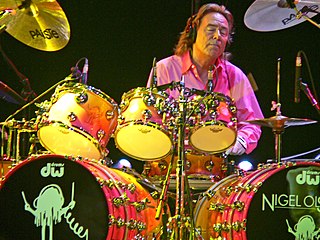
Nigel Olsson is an English rock drummer best known for his long-time affiliation with Elton John. A dynamic drummer and backing vocalist, Olsson helped establish the Elton John sound as a member of the Elton John Band alongside bassist Dee Murray.

Too Low for Zero is the seventeenth studio album by English musician Elton John, released in 1983. The album marked a comeback for John, whose previous four albums had failed to yield many enduring international hit singles, and had disappointing sales compared to his string of hit records released during the first half of the 1970s.

Reg Strikes Back is the twenty-first studio album by English musician Elton John, released in 1988. It was his self-proclaimed comeback album, and his own way of fighting back against bad press. The "Reg" in Reg Strikes Back refers to John's birth name, Reginald Kenneth Dwight.
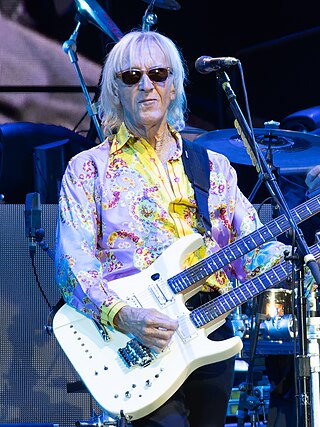
David William Logan Johnstone is a Scottish rock guitarist and vocalist, best known for his long-time collaboration with Elton John as a member of the Elton John Band.

Breaking Hearts is the eighteenth studio album by English musician Elton John, released in 1984. It features the quartet of John, Davey Johnstone, Dee Murray and Nigel Olsson. There were four top-40 singles from the album: "Sad Songs ", "Who Wears These Shoes", "In Neon", and the UK No. 5 hit "Passengers".

David Murray Oates, known as Dee Murray, was an English bass guitarist. He was best known for his long-time collaboration with Elton John as a member of the Elton John Band.

To Be Continued... is a four-disc box set by English musician Elton John, originally released in 1990. The box set was compiled by John and Bernie Taupin that same year. It details John's music from his days with Bluesology to the then-present day.
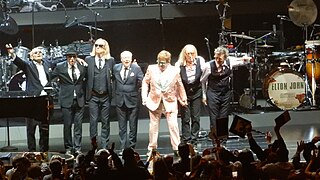
The Elton John Band is the band that backs singer, composer and pianist Elton John on both studio and live recordings. The band has gone through several lineup changes, but Nigel Olsson, Davey Johnstone, and Ray Cooper have been members since 1970, 1971 and 1973, respectively. The various lineups of the band have consisted of both British, American, and European musicians. The band is often not recognised as a formal entity, and is instead referred to simply as the Elton John Band.

"I Guess That's Why They Call It the Blues" is a song by English musician Elton John, with music by John and Davey Johnstone and lyrics by Bernie Taupin, released as the first single from John's 17th studio album Too Low for Zero. It was the first single since 1975's "Someone Saved My Life Tonight" to feature the classic lineup of the Elton John Band.

"Mona Lisas and Mad Hatters (Part Two)" is a song by English musician Elton John and songwriter Bernie Taupin from the album Reg Strikes Back. It was released as a 12" single in 1988 only in the United States. The single did not include the basic version from Reg Strikes Back album.

Tommy is a soundtrack album by The Who with contributions from numerous artists. The soundtrack was used in the 1975 Tommy film that was based on the original album that was released by The Who in 1969. Pete Townshend oversaw the production of this double-LP recording that returned the music to its rock roots, and on which the unrecorded orchestral arrangements he had envisaged for the original Tommy LP were realised by the extensive use of synthesiser.
The Too Low for Zero Tour was a concert tour by English musician and composer Elton John, in support of his 17th studio album Too Low for Zero. The tour consisted in 24 shows across Australia, New Zealand and Hong Kong.
The 1980 World Tour was a concert tour by English musician and composer Elton John, in support of his 14th studio album 21 at 33. the tour included two legs and a total of 63 shows.

Passengers is a 1984 song by English musician Elton John that appears on his 1984 album Breaking Hearts, released as the second single of the album. The song reached number five on the UK chart, and reached the top ten in Australia, but was not released as a single in the US.













